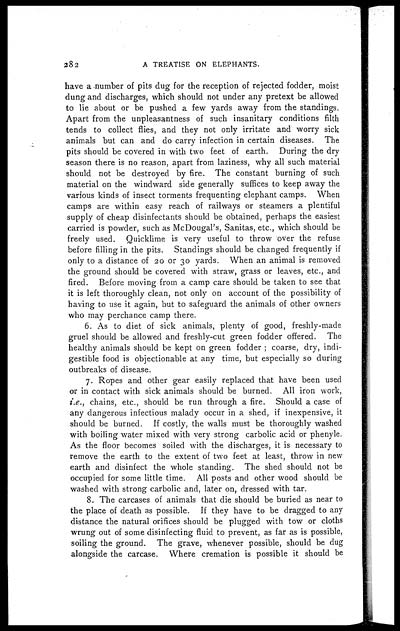Medicine - Veterinary > Veterinary diseases > Elephants and their diseases > Part V - Infective diseases
(342) Page 282
Download files
Individual page:
Thumbnail gallery: Grid view | List view

282 A TREATISE ON ELEPHANTS.
have a number of pits dug for the reception of rejected fodder, moist
dung and discharges, which should not under any pretext be allowed
to lie about or be pushed a few yards away from the standings.
Apart from the unpleasantness of such insanitary conditions filth
tends to collect flies, and they not only irritate and worry sick
animals but can and do carry infection in certain diseases. The
pits should be covered in with two feet of earth. During the dry
season there is no reason, apart from laziness, why all such material
should not be destroyed by fire. The constant burning of such
material on the windward side generally suffices to keep away the
various kinds of insect torments frequenting elephant camps. When
camps are within easy reach of railways or steamers a plentiful
supply of cheap disinfectants should be obtained, perhaps the easiest
carried is powder, such as McDougal's, Sanitas, etc., which should be
freely used. Quicklime is very useful to throw over the refuse
before filling in the pits. Standings should be changed frequently if
only to a distance of 20 or 30 yards. When an animal is removed
the ground should be covered with straw, grass or leaves, etc., and
fired. Before moving from a camp care should be taken to see that
it is left thoroughly clean, not only on account of the possibility of
having to use it again, but to safeguard the animals of other owners
who may perchance camp there.
6. As to diet of sick animals, plenty of good, freshly-made
gruel should be allowed and freshly-cut green fodder offered. The
healthy animals should be kept on green fodder ; coarse, dry, indi-
gestible food is objectionable at any time, but especially so during
outbreaks of disease.
7. Ropes and other gear easily replaced that have been used
or in contact with sick animals should be burned. All iron work,
i.e., chains, etc., should be run through a fire. Should a case of
any dangerous infectious malady occur in a shed, if inexpensive, it
should be burned. If costly, the walls must be thoroughly washed
with boiling water mixed with very strong carbolic acid or phenyle.
As the floor becomes soiled with the discharges, it is necessary to
remove the earth to the extent of two feet at least, throw in new
earth and disinfect the whole standing. The shed should not be
occupied for some little time. All posts and other wood should be
washed with strong carbolic and, later on, dressed with tar.
8. The carcases of animals that die should be buried as near to
the place of death as possible. If they have to be dragged to any
distance the natural orifices should be plugged with tow or cloths
wrung out of some disinfecting fluid to prevent, as far as is possible,
soiling the ground. The grave, whenever possible, should be dug
alongside the carcase. Where cremation is possible it should be
Set display mode to: Large image | Zoom image | Transcription
Images and transcriptions on this page, including medium image downloads, may be used under the Creative Commons Attribution 4.0 International Licence unless otherwise stated. ![]()
| India Papers > Medicine - Veterinary > Veterinary diseases > Elephants and their diseases > Infective diseases > (342) Page 282 |
|---|
| Permanent URL | https://digital.nls.uk/75193086 |
|---|



![[Page281]](https://deriv.nls.uk/dcn4/7519/75193085.4.jpg)
